
Preston Sturges was an American playwright, screenwriter, and film director. Sturges took the screwball comedy format of the 1930s to another level, writing dialogue that, heard today, is often surprisingly naturalistic and mature, despite the farcical situations. It is not uncommon for a Sturges character to deliver an exquisitely turned phrase and take an elaborate pratfall within the same scene.

The Great McGinty is a 1940 political satire comedy film written and directed by Preston Sturges, starring Brian Donlevy and Akim Tamiroff and featuring William Demarest and Muriel Angelus. It was Sturges's first film as a director; he sold the story to Paramount Pictures for just $10 on condition he direct the film. Sturges received an Oscar for Best Original Screenplay.
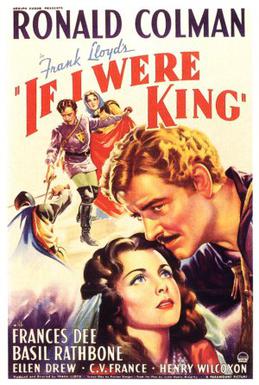
If I Were King is a 1938 American biographical and historical film starring Ronald Colman as medieval poet François Villon, and featuring Basil Rathbone and Frances Dee. It is based on the 1901 play and novel, both of the same name, by Justin Huntly McCarthy, and was directed by Frank Lloyd, with a screenplay adaptation by Preston Sturges.

Romance in Manhattan is a 1935 American romantic comedy film directed by Stephen Roberts, starring Francis Lederer and Ginger Rogers, and released by RKO Radio Pictures.

Diamond Jim is a 1935 biographical film based on the published biography Diamond Jim Brady by Parker Morell. It follows the life of legendary entrepreneur James Buchanan Brady, including his romance with entertainer Lillian Russell, and stars Edward Arnold, Jean Arthur, Cesar Romero and Binnie Barnes.
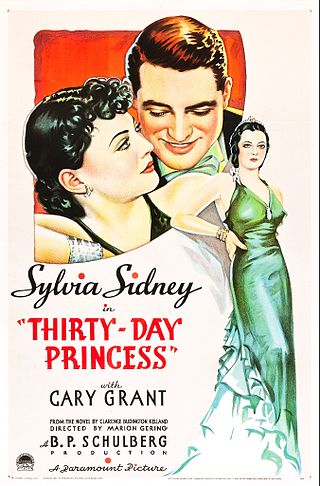
Thirty Day Princess is a 1934 pre-Code comedy film directed by Marion Gering and starring Sylvia Sidney, Cary Grant and Edward Arnold. The film was based on a story of the same name by Clarence Budington Kelland, adapted by Sam Hellman and Edwin Justus Mayer, and written by Preston Sturges and Frank Partos.

Strictly Dishonorable is a 1951 romantic comedy film written, produced and directed by Melvin Frank and Norman Panama, and starring Ezio Pinza and Janet Leigh. It is the second film to be based on Preston Sturges' 1929 hit Broadway play of the same name after a pre-Code film released by Universal Pictures in 1931 with the same title.
Strictly Dishonorable is a romantic comedy play written by Preston Sturges and first produced on Broadway in 1929. It was adapted for the screen twice, first in 1931, then again in 1951. The play was Sturges' second Broadway production, and the first of his plays to be made into a film. The Attic Theater Company revived the show at The Flea Theater in the summer of 2014.
Strictly Dishonorable can refer to:
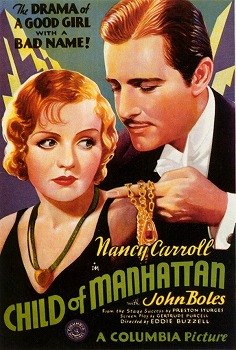
Child of Manhattan is a 1933 American pre-Code melodrama film based on the play Child of Manhattan by Preston Sturges, which was presented on Broadway in 1932. The film was directed by Edward Buzzell and written for the screen by Gertrude Purcell, and stars Nancy Carroll, star of musical comedies at Paramount, John Boles, and cowboy star Charles "Buck" Jones.
Child of Manhattan is a 1932 play by Preston Sturges, his fifth to be produced on Broadway and his last for almost twenty years as his career took him to Hollywood. It was adapted into a film of the same name, released in 1933 by Columbia Pictures, the second play of Sturges' to make it to the silver screen, after 1929's Strictly Dishonorable.

Never Say Die is a 1939 American romantic comedy film starring Martha Raye and Bob Hope. Based on a play of the same title by William H. Post and William Collier Sr., which ran on Broadway for 151 performances in 1912, the film was directed by Elliott Nugent and written for the screen by Dan Hartman, Frank Butler and Preston Sturges. The supporting cast features Andy Devine, Alan Mowbray, Gale Sondergaard, Sig Ruman and Monty Woolley.
Hotel Haywire is a 1937 American comedy film written by Preston Sturges with uncredited rewrites by Lillie Hayward. It was directed by George Archainbaud and stars Leo Carrillo, Lynne Overman, Spring Byington, Benny Baker and Colette Lyons.

The Good Fairy is a 1935 romantic comedy film written by Preston Sturges, based on the 1930 play A jó tündér by Ferenc Molnár as translated and adapted by Jane Hinton, which was produced on Broadway in 1931. The film was directed by William Wyler and stars Margaret Sullavan, Herbert Marshall, Frank Morgan and Reginald Owen.

The Beautiful Blonde from Bashful Bend is a 1949 romantic comedy Western film starring Betty Grable and featuring Cesar Romero and Rudy Vallee. It was directed by Preston Sturges and written by him based on a story by Earl Felton.

Fast and Loose is a 1930 American pre-Code romantic comedy film directed by Fred C. Newmeyer and starring Miriam Hopkins, Carole Lombard and Frank Morgan. The film was written by Doris Anderson, Jack Kirkland and Preston Sturges, based on the 1924 play The Best People by David Gray and Avery Hopwood. Fast and Loose was released by Paramount Pictures.
They Just Had to Get Married is a 1932 American pre-Code comedy film directed by Edward Ludwig and starring Slim Summerville, ZaSu Pitts, Roland Young, and Verree Teasdale.
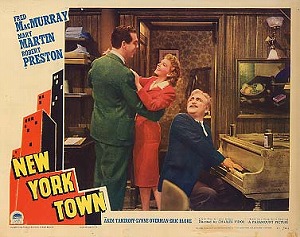
New York Town is a 1941 American romantic comedy film directed by Charles Vidor and starring Fred MacMurray, Mary Martin, Akim Tamiroff, and Robert Preston. The film was written by Lewis Meltzer and an uncredited Preston Sturges based on a story by Jo Swerling.
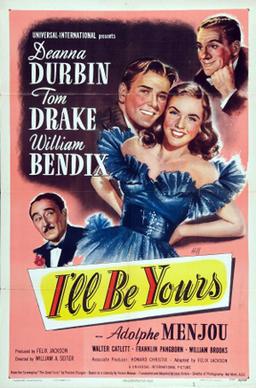
I'll Be Yours is a 1947 American musical comedy film directed by William A. Seiter and starring Deanna Durbin. Based on the play A jó tündér by Ferenc Molnár, the film is about a small-town girl who tells a fib to a wealthy businessman, which then creates complications. The play had earlier been adapted for the 1935 film The Good Fairy by Preston Sturges.

William Ricciardi was an Italian actor known for his role as Signor Baldini in San Francisco (1936). He also appeared in the Phil Rosen film The Heart of a Siren (1926). In Anthony Adverse (1936) he had a splendid cameo as the talkative coachman who converses with Adverse, played by Fredric March.















